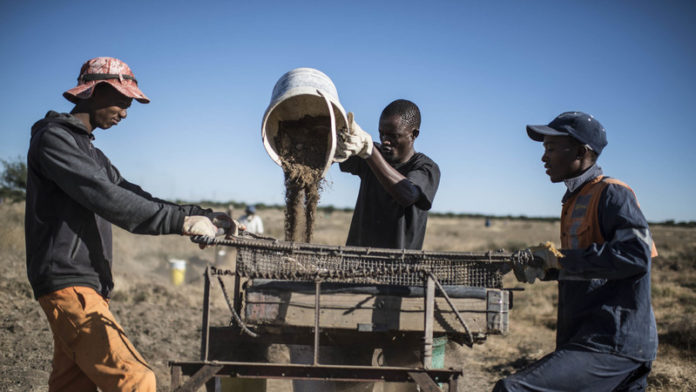
PETRA Diamonds has taken a second run at solving the pressures caused by artisanal mining at its South African operations opening up a tailings dam at its Koffiefontein mine in the Free State province to small scale miners.
The company said it would take “learnings” from a similar exercise at Kimberley in the Northern Cape, a scheme in which it allowed artisanal miners to operate “the floors” of the Kimberley property. This is an area previously worked by Kimberley’s founding miners in which ground was allowed to weather prior to mining, and which still contained diamonds.
However, the scheme wasn’t a complete success. Forged with its then joint venture partner, Ekapa Mining in 2017, the arrangement backfired on Ekapa as a year later it reported still spending R3m a month in security keeping artisanal miners from its operating boundaries. Petra divested from the Ekapa Joint Venture in 2018.
Richard Duffy, CEO of Petra, said in an announcement today that he welcomed the Koffiefontein Community Mining Primary Cooperative (KCM) – the project beneficiaries – “… as partners in our industry to complement our own operations and extract optimal benefit from the diamond reserves in Koffiefontein”.
The aim was to create a framework within which Artisanal Small Scale Mining can be “… conducted by community members in a legal and regulated manner”. This included meeting the precepts of the Kimberley Process which authenticates the provenance of diamonds. Work on the project at Koffiefontein had begun, the company said.
Ekapa’s continued problems with artisanal miners is that a third force moved into the mining operations. At the time of this flare-up, in August, Ekapa issued a statement saying: “Kimberley Ekapa Mining is reliably informed that an alleged new third force of illegal miners is attempting to muscle in and around the Batho Pele initiative (the deal struck with Ekapa, Petra, and stakeholders including artisanal miners in 2017).
“They are using force; trespassing; conducting illegal mining; sabotaging mine infrastructure and allegedly being supported by illegal diamond traders”. Asked what was being done about the situation, the company replied: “Kimberley Ekapa Mining is working closely with all relevant stakeholders … to ensure the success of the initiative”.
Artisanal mining on the borders of existing mining operations, and illegal mining when the artisanal activities move into mine boundaries, is a global phenomenon, but seems to have particular traction in Africa.
In 2016, thousands of artisanal miners “invaded” the premises of AngloGold Ashanti’s Obuasi gold mine in Ghana after the company had mothballed the operation. Ghana only began to respond to the problem three months after the initial invasion.
In a more serious development, Glencore confirmed in June that more than 40 artisanal miners lost their lives after a collapse of ground at its Kamoto Copper Company mine in the Democratic Republic of the Congo.










